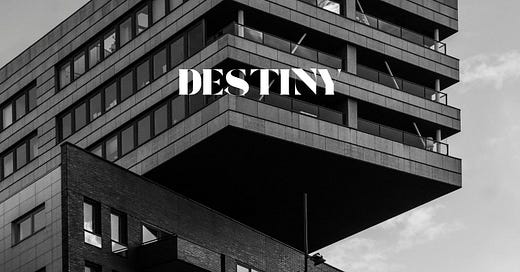Are Muslims using religion as an excuse to do this...?
Is this belief in Islam being so misunderstood it's leading to a catastrophic failure in your deeds?
This post was originally behind the paywall. If after reading it you find that it helped you think differently, save time or move forward—consider leaving a $5+ tip.
Your support keeps high-quality life strategies accessible and helps sustain this work for even more goal-oriented Muslims.
Tell me if any of the following sound familiar:
I can’t do anything, the enemy is too strong
It’s all in Allah’s Hands so we should just work on ourselves and pray
We can’t do anything until the Mahdi arrives
The Jews control everything
The elites like Bill Gates want to [fill in the blank]…
The topic of action vs fate is one that continues to baffle me.
Not because we can’t understand it.
But because I see far too many Muslims coming up with excuses for why we apparently can’t do anything (whatever “anything” means to them)… and I’m fed with Muslims using religious sounding language to justify these excuses.
A lot of the excuses we make can be summed up as a misunderstanding of Qadr.
Let’s understand two extreme examples from history:
A group of Muslims used Qadr as an excuse to avoid personal responsibility. They blamed all their problems on Qadr (fate, predetermination, destiny) and made no effort to change because they felt their destiny was written so why try.
I hope readers of this publication and people who care about Muslim Betterment need no further explanation for why this type of defeatist attitude is not part of Islam.
Another group of Muslims rejected Qadr altogether. They believed in the idea that you shape your own destiny and are in charge of your own life. This is the type of attitude you see from some self help gurus and influencers.
The middle path:
We believe Allah is the One who gives us the ability to do things but it is our responsibility to make the effort. The more we try the more help we get. Ultimately we are reliant on His Assistance in all our affairs.
Qadr is the sixth pillar of faith… we must believe in it. And rejecting it can take a person out of the fold of Islam.
But how do we hold this belief and also take personal responsibility and how does it impact our actions?
This is not a publication on theology by any stretch of the imagination. But here are some practical points we can understand using goal setting:
We must believe that Allah is in charge of everything and knows everything.
Allah knows our future—we do not. We live our lives and plan with optimism, hope and full reliance on Allah.
This drives us to aim high, work hard, and do our best. We do not limit ourselves. Rather we know as Muslims we are supposed to be the forerunners in all that is good in the world and make firm intentions to make it happen… and follow through with consistent action.
We can only talk about Qadr after it has happened. Meaning you do not know how much money you were meant to make today… until the day is over. Just like you didn’t know you would read about Qadr in this newsletter today until you read it. So we use Qadr to make sense of the past… not to make excuses for the future.
You do not know the future—and it’s because you don’t know… you work harder. So plan. Do set goals. Have high ambitions. Find Muslims with shared aims. Work your hardest to fulfill those plans. Then at the end of each day…
Accept your Qadr for that day. Thank Allah for what He has blessed you with. Be content with your results. Analyse what you can improve on. Ask Him to keep helping you. And repeat the cycle the next day.
Muslims cannot reject Qadr as a pillar of faith, nor can we use it as an excuse for inaction or laziness.
Qadr helps us cope with the past… and gives us hope for the future.
If you found this helpful why not share it with one other person who would benefit?
And for an easy to follow guide on how to plan your ideal life for the next 10 years and beyond… I strongly urge you to check out my goal setting guide.
Are you working on your goals? Let’s talk about it:





Absolutely! Well said. It sounds odd to say but you almost have to 'meet Allah halfway'. But I like and agree with your breakdown.